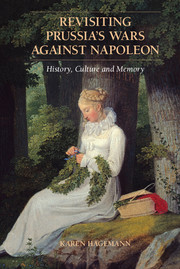Book contents
- Frontmatter
- Epigraph
- Contents
- List of Figures and Maps
- List of Abbreviations
- Acknowledgments
- Revisiting Prussia’s Wars against Napoleon
- Part One A History of Defeat, Crisis and Victory
- 1 The Defeat of 1806 and Its Aftermath
- 2 Reform and Revenge
- 3 Liberation and Restoration
- Conclusion
- Part Two Discourses on the Nation, War and Gender
- Part Three Collective Practices of De/Mobilization and Commemoration
- Part Four Literary Market, History and War Memories
- Part Five Novels, Memory and Politics
- Epilogue Historicizing War and Memory, 2013–1813–1913
- Bibliography
- Name Index
- Subject Index
- Plate section
- References
3 - Liberation and Restoration
The Wars of 1813–1815 and Their Legacy
Published online by Cambridge University Press: 05 March 2015
- Frontmatter
- Epigraph
- Contents
- List of Figures and Maps
- List of Abbreviations
- Acknowledgments
- Revisiting Prussia’s Wars against Napoleon
- Part One A History of Defeat, Crisis and Victory
- 1 The Defeat of 1806 and Its Aftermath
- 2 Reform and Revenge
- 3 Liberation and Restoration
- Conclusion
- Part Two Discourses on the Nation, War and Gender
- Part Three Collective Practices of De/Mobilization and Commemoration
- Part Four Literary Market, History and War Memories
- Part Five Novels, Memory and Politics
- Epilogue Historicizing War and Memory, 2013–1813–1913
- Bibliography
- Name Index
- Subject Index
- Plate section
- References
Summary
The wars of 1813–14 were the first in Prussian history to be conducted based on universal conscription. A first step was the enactment on 9 February 1813 of the “Edict Lifting Previous Exemptions from Cantonal Duties for the Duration of the War,” drafted by General Scharnhorst, which introduced compulsory military service for all men between the ages of 17 and 24 who had previously been exempt. Those who volunteered for a rifle detachment on foot or horseback or an artillery detachment within eight days could choose their own units. Those who came later had to serve in the unit assigned to them by the military authorities. Young men in frail health; those whose fathers had died and who had inherited the running of a town house, farm or larger property; the sons of widows without older brothers who were not serving in the military; those who were known as the sole breadwinners of their families; and “active and salaried officials” of the Prussian state as well as clerics remained exempt. The edict thus retained broad exemptions from service in the standing army. As the military reformers intended, service in the standing army became exclusively a matter for young, unmarried men with no domestic establishment of their own. In order to make service attractive, they were assured that “every man in the military, without regard to estate and wealth, shall be given the chance, according to his abilities and conduct, to be promoted to officer or non-commissioned officer as soon as he has served one month and the opportunity arises, and shall have a preferred claim to a position in the civil service.” In addition, more political rights were promised to all men who willingly fulfilled their military duties.
- Type
- Chapter
- Information
- Revisiting Prussia's Wars against NapoleonHistory, Culture, and Memory, pp. 61 - 72Publisher: Cambridge University PressPrint publication year: 2015



